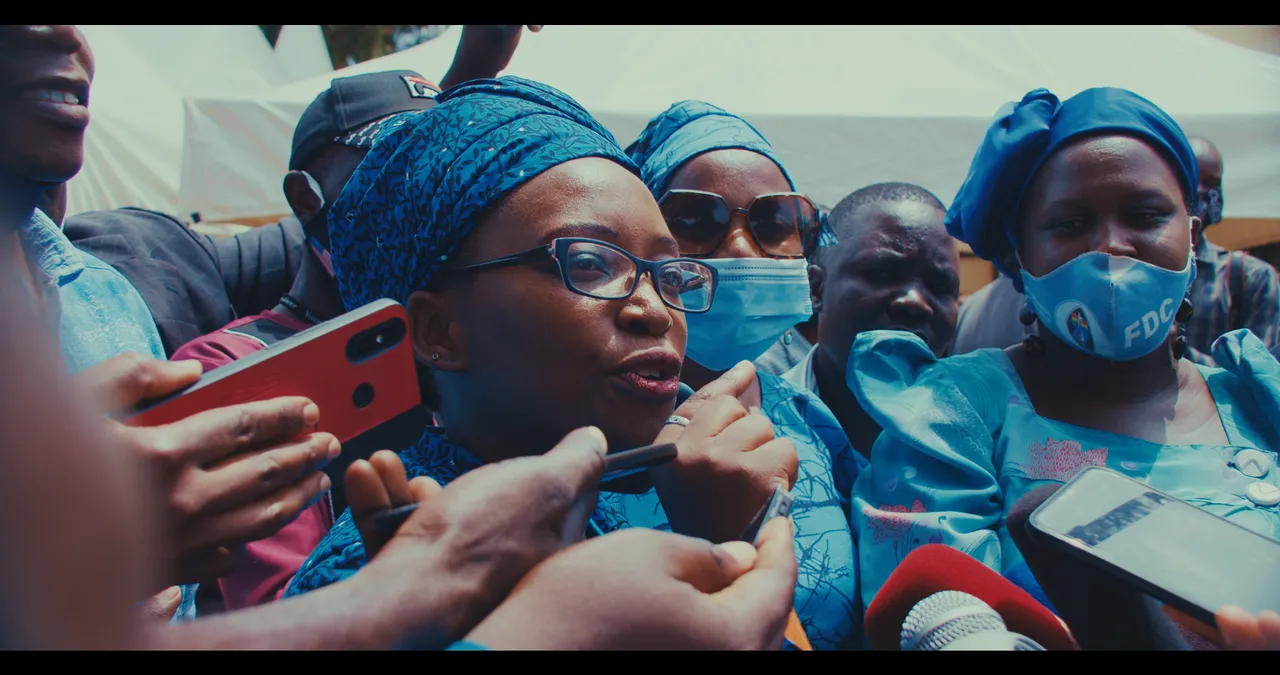The Woman Who Poked the Leopard
The Woman Who Poked the Leopard
VERDICT: Ugandan poet, political activist and professional troublemaker Stella Nyanzi is the explosively charismatic subject of director Patience Nitumwesiga's assured debut feature.
A highly entertaining film about a highly unorthodox human rights campaigner, The Woman Who Poked the Leopard justifies its Stieg Larsson-like title with its gloriously larger-than-life heroine: the Ugandan poet, academic, political activist and force of nature, Dr. Stella Nyanzi. A one-woman Pussy Riot who proudly pursues a strategy of “revolutionary rudeness”, Nyanzi has faced serious threats to her life and livelihood due to her bravely outspoken support for LGBT equality, minority rights and feminist causes in Uganda, not to mention her potty-mouthed attacks on her country’s long-serving authoritarian president Yoweri Museveni. In 2017 she was arrested after posting a poem on social media showering Museveni with scabrous, scatological, hilariously vulgar insults.
A fellow Ugandan, poet and playwright turned film-maker Patience Nitumwesiga paints a rich, detailed portrait of Nyanzi with this impressive debut feature. The Woman Who Poked the Leopard is a slightly untidy sprawl in places, but its protagonist is such an explosively charismatic subject that a few loose ends scarcely matter. Fresh from its world premiere in competition at Dok Leipzig, this colourful documentary should find a keen audience at further festivals and beyond, with a berth already booked at IDFA next month.
The Woman Who Poked the Leopard opens in the German city of Munich, where Nyanzi and her three teenage children have lived for their own safety since 2022 on a writers-in-exile scholarship from anti-censorship campaign group PEN. Cutting away from these more contemporary scenes, Nitumwesiga fills in her back story in a series of non-linear flashbacks, including two lively sequences that show her protesting her legally dubious firing from Uganda’s Makerere University in 2016, then returning to host a rabble-rousing meeting there four years later. Each of these clashes culminates in Nyanzi stripping semi-naked, singing loudly and shouting down police officers who try to remove her as “rapists” and “terrorists”.
But the most jaw-dropping set-piece here features footage from Nyanzi’s court case in 2018, where she takes the dock to denounce Museveni as a “dirty delinquent dictator”, calls the judge an idiot, drops a barrage of F-bombs and flashes her breasts. When she is sentenced to jail time, a riot breaks out among her screaming supporters. Mitumwesiga should probably have opened her film with these amazing scenes, though in fairness Nyanzi has a flair for turning even the most banal event into an attention-grabbing spectacle. Her account of her time in prison, including the brutal miscarriage of a baby she named Freedom, brings an abrupt shift from dark comedy to tragedy.
The film’s main narrative thread takes place in 2020, when Nyanzi runs for political office in Uganda’s capital, Kampala, during the COVID-19 pandemic. Nitumwesiga tracks her progress in nail-biting detail, from fractious media debates and campaign meetings in the city’s slums to her ultimate, questionable defeat at the ballot box. The wider 2021 general election, which returned Museveni to power for a fifth presidential term, was widely condemned for vote-rigging, ballot-stuffing, harassment of opposition candidates and violent protests which left more than 50 people dead. Having rewritten Uganda’s election rules to allow him to run again, Museveni is seeking a sixth term next year, marking four decades in power.
The Woman Who Poked the Leopard is clearly a love letter to Nyanzi, but it is not wholly uncritical. Nitumwesiga applies a more personal, emotional focus in the film’s final act, delicately probing how her heroine’s notoriety as a public figure has impacted on her children and domestic life. Her strikingly beautiful daughter Baraka, prematurely wise and world-weary at 16, plays an impressive role here as unofficial family therapist, taking on surrogate maternal responsibilty for her younger twin brothers Kato and Wasswa. When Baraka confronts her mother over her self-absorbed aloofness, she becomes awkward and defensive. That said, Nyanzi is primarily motivated by her children’s welfare when she reluctantly agrees to go into European exile, alarmed by the Ugandan regime’s savage torture and imprisonment of another satirical writer, Kakwenza Rukirabashaija.
Nitumwesiga and her team use a mostly hand-held shooting style, often using long takes to tease out emotional subtext. Deployed sparingly but effectively, a background soundtrack spans East African folk music, a burst of Mozart and a grimly ironic use of Uganda’s uplifting nation anthem, which plays over a montage of police brutality against unarmed protesters. Angry and harrowing one minute, hilarious and inspiring the next, The Woman Who Poked the Leopard pays worthy tribute to a complex but immensely admirable figure bravely standing up to patriarchal thugs who hide behind dubious notions of respectability and tradition. Which makes this not just an African story but increasingly, depressingly universal.
Director: Patience Nitumwesiga
Cinematography: Racheal Mambo, Phil Wilmot
Editing: Kristen van Schie
Music: Sylvia Babirye
Production companies, world sales: Shagika (Uganda), Parabellum (Germany)
Producers: Rosie Motene, Phil Wilmot, Patience Nitumwesiga
Venue: Dok Leipzig Festival (German Competition Documentary Film)
In English, Luganda
107 minutes

